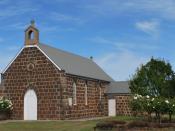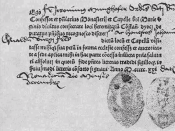Key Ingredients that Engendered the Protestant Reformation
Since the foundations of the Christian faith, the Catholic denomination has consistently been the most powerful and largest church community. The Pope held supreme religious power over the world and eventually held position as an important governmental figure. Throughout the times of the Middle Ages and Renaissance the Roman Catholic Church was the central basis and concern for all people. They forced people to obey their laws and pay sums of money under the threat of possible excommunication if disobedience occurred. The civilians during these time periods were helpless against the church's power; they could not read or even understand the services or teachings of the Bible, so they were forced to trust the Roman Catholic Church for all knowledge that was shared. However, despite the church's great religious authority, disputes and lax practices had grown up within the church, but it was not until the invention of the printing press when the followers of the Roman Catholic Church began to recognize such discrepancies.
The issues of the sales of indulgences and the elevating power of the Roman Catholic Church lead corruption further into the religious establishment, but due to the invention of the printing press and to the rise of individualism the Protestant Reformation continued to thrive.
Before the introduction of indulgences, the Catholic Church practiced the orthodox routine of confessions. The sales of indulgences were created for the sinner to pay their debt out of purgatory, but not to replace the practicing of confessions. The public began rapidly using the sales of indulgences to pardon their sins, rather than attending confessions, but little did they know the profits were going to towards the construction of St. Peter's Bastille. The sale of indulgences gradually began to be questioned. Were the sales of...


Great Paper
This is one of the better papers I have seen on Protestant Reformation. It is virtually mistake free, and I contains lots of facts and info! Keep on chuggin GaurdyN!
8 out of 8 people found this comment useful.